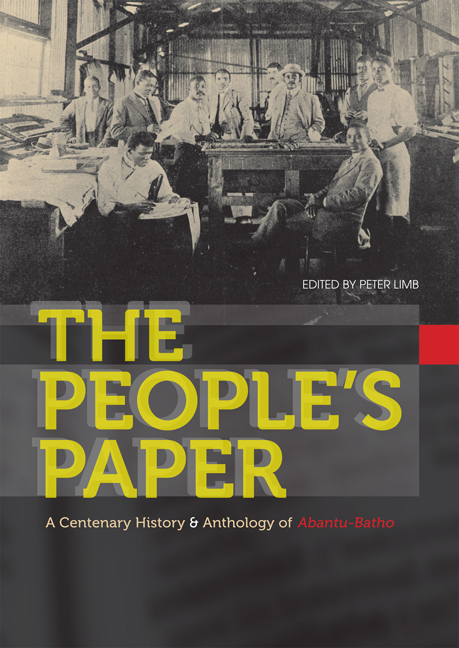Book contents
- Frontmatter
- Contents
- Contributors
- Acknowledgements
- Preface
- List of Abbreviations and Acronyms
- List of Illustrations
- PART I Essays
- Overview
- FOUNDERS AND EDITORS
- THEMES AND CONNECTIONS
- Chapter 6 The Swazi Royalty and the Founding of Abantu-Batho in a Regional Context
- Chapter 7 Abantu-Batho and the Xhosa Poets
- Chapter 8 African Royalty, Popular History and Abantu-Batho
- Chapter 9 ‘Johannesburg in Flames’: The 1918 Shilling Campaign, Abantu-Batho and Early African Nationalism in South Africa
- Chapter 10 Garveyism, Abantu-Batho and the Radicalisation of the African National Congress during the 1920s
- Chapter 11 An African Newspaper in Central Johannesburg: The Journalistic and Associational Context of Abantu-Batho
- Conclusion: Assessing the Decline and Legacy of Abantu-Batho
- PART II Anthology
Chapter 6 - The Swazi Royalty and the Founding of Abantu-Batho in a Regional Context
from THEMES AND CONNECTIONS
Published online by Cambridge University Press: 21 April 2018
- Frontmatter
- Contents
- Contributors
- Acknowledgements
- Preface
- List of Abbreviations and Acronyms
- List of Illustrations
- PART I Essays
- Overview
- FOUNDERS AND EDITORS
- THEMES AND CONNECTIONS
- Chapter 6 The Swazi Royalty and the Founding of Abantu-Batho in a Regional Context
- Chapter 7 Abantu-Batho and the Xhosa Poets
- Chapter 8 African Royalty, Popular History and Abantu-Batho
- Chapter 9 ‘Johannesburg in Flames’: The 1918 Shilling Campaign, Abantu-Batho and Early African Nationalism in South Africa
- Chapter 10 Garveyism, Abantu-Batho and the Radicalisation of the African National Congress during the 1920s
- Chapter 11 An African Newspaper in Central Johannesburg: The Journalistic and Associational Context of Abantu-Batho
- Conclusion: Assessing the Decline and Legacy of Abantu-Batho
- PART II Anthology
Summary
In 1912 the non-literate Swazi queen regent, Labotsibeni Mdluli, supplied crucial financing that enabled Johannesburg-based missionary-educated intellectuals Pixley ka Isaka Seme and Daniel Letanka to start a new newspaper, Abantu-Batho. Seme and Letanka were founding activists of the recently formed South African Native National Congress (SANNC). Abantu-Batho aimed to have national scope in the new South African nation state. The newspaper's politics expressed the similar ambitions of the SANNC to create a new, unified African nation.
A general sense of Labotsibeni's role in the founding was known by SANNC activists at the time. They remembered it in written2 and oral historical3 forms that entered what we might call African National Congress (ANC) movement folklore. From there it moved into the overlapping activist historical writing that Lucien van der Walt calls ‘the Communist School’ of the history of South African radicalism,4 and ultimately into scholarly historiography.5 But some of what was remembered was also substantially incorrect in detail, dramatically overstating the scale of Labotsibeni's financial contribution to the paper, although not the functional centrality of that contribution.
On the other hand, Abantu-Batho's association with the Swazi royalty, with Swazi persons, and with Swaziland-connected communities and persons inside the Union, profoundly shaped the paper and its role in SANNC politics. All of Abantu- Batho's known main English and isiZulu editors from 1912 through mid-1917 (Cleopas Kunene, Robert Grendon and Saul Msane), its long-time secretary (Cleopas Mabaso), and its first managing director and co-founder (Seme), as well as writers like Selby and Richard Msimang, had deep Swaziland ties. The paper had strong connections in Natal and in the Natal Native Congress (NNC) through Swazi ties to the Edendale community and its offshoots. These overlapped with Zulu-focused politics, particularly over regional and ideological factions within the NNC and ties to the unrecognised Zulu king Solomon kaDinuzulu, which spilled over into the SANNC and Transvaal Native Congress (TNC).
Relatedly, at its inception Abantu-Batho embodied in the journalistic sphere a wider political strategy pursued by Seme and other SANNC founders. They sought to forge a new political African nation, able to contend for inclusion and power with white people within the new South African national state.
- Type
- Chapter
- Information
- The People’s PaperA Centenary History & Anthology of Abantu-Batho, pp. 174 - 200Publisher: Wits University PressPrint publication year: 2012



